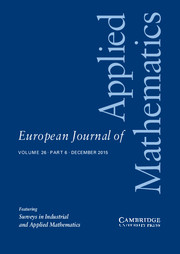Article contents
Variational models for moving contact lines and the quasi-static approximation
Published online by Cambridge University Press: 23 November 2005
Abstract
This paper proposes the use of a variational framework to model fluid wetting dynamics. The central problem of infinite energy dissipation for a moving contact line is dealt with explicitly rather than by introducing a specific microscopic mechanism which removes it. We analyze this modelling approach in the context of the quasi-steady limit, where contact line motion is slower than bulk relaxation. We find that global effects enter into Tanner-type laws which relate line velocity to apparent contact angle through the role that energy dissipation plays in the bulk of the fluid. A comparison is made to the dynamics of lubrication equations that include attractive and repulsive intermolecular interactions. A Galerkin-type approximation method is introduced which leads to reduced-dimensional dynamical descriptions. Computations are conducted using these low-dimensional approximations, and a substantial connection to lubrication equation dynamics is found.
- Type
- Papers
- Information
- Copyright
- 2005 Cambridge University Press
- 8
- Cited by


